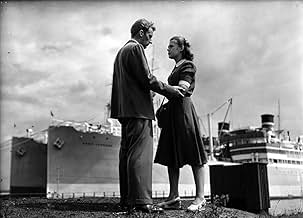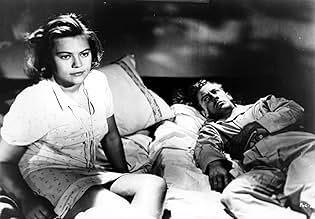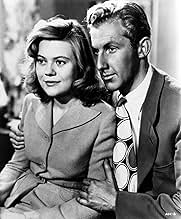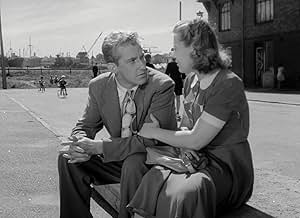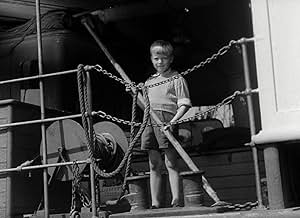Una obrera con tendencias suicidas, salida del reformatorio y ansiosa por huir de su dominante madre, se enamora de un marinero que no puede perdonar el pasado de la chica.Una obrera con tendencias suicidas, salida del reformatorio y ansiosa por huir de su dominante madre, se enamora de un marinero que no puede perdonar el pasado de la chica.Una obrera con tendencias suicidas, salida del reformatorio y ansiosa por huir de su dominante madre, se enamora de un marinero que no puede perdonar el pasado de la chica.
- Dirección
- Guionistas
- Elenco
Edvard Danielsson
- Klockaren
- (escenas eliminadas)
Carl Deurell
- Prästen
- (escenas eliminadas)
Kolbjörn Knudsen
- En sjöman
- (escenas eliminadas)
Gunnar Nielsen
- En herre (1)
- (escenas eliminadas)
Opiniones destacadas
6sol-
An early film from Ingmar Bergman, it is just as interesting on a visual scope as his films usually are, with the docklands filmed well and good use of panning and dolly work throughout. In terms of story and acting though, this is rather ordinary stuff, despite some interesting ideas and philosophies about freedom. It seems the easy way to out to just classify this film as interesting but not up to the standard that Bergman would later set, however I cannot think of much else to say here. It certainly is not as thought-provoking and intense as some of his later films, and for those not interested in Bergman or clever camera movement, I could easily imagine this piece coming across as boring.
For viewers born decades after the end of the second worldwide conflict, it's hard to imagine anything but joy and optimism in the hearts of the younger population that went through what was probably the hardest (and certainly darkest) part of their lives. We've all basked in stories, real and fictional, that knighted those who fathered the baby-boomers with the title of the greatest generation, one whose youth was sacrificed at history's altar ... but that's overlooking their ordinariness, how modest their aims were and thus how poignantly relatable their lives could be outside the epic scope of war and other life-and-death situations.
When Ingmar Bergman "Port of Call" starts, war is way over and there's no any indication of life-threatening situations yet the film opens with a startling suicide attempt: a girl takes a big dive from a dock and many people come to rescue her, including a war veteran who just settled in the port town. From what it looks like, the two protagonists didn't benefit from the kind of existential canvases that invite for optimism: the man is a sailor back from war, disillusioned and hiding his easy-going nature behind a mask of cynicism, his name is Gösta (Bengt Eklund), the woman is a young factory girl, depressed and insecure, with the kind of troubled past that makes any romance doomed from the start, and whose roots are to be found within a tense relationship with her overbearing mother. She's Berit (Nine-Chrstine Jönsson).
Those were the neo-realism days in Europe and the noir era in the U.S.A, the film, maybe unconsciously driven by these two influences, doesn't intend to paint a glamorous romance of any kind but rather a life capsule in a small seaside working-class town, a sort of Swedish "On the Waterfront" where we follow the lives of two loners as they converged one night at a dance. It's an immediate and mutual appreciation that never feels forced nor contrived, it IS believable that the two would find oasis of serenity within each other. To use fitting metaphors, Gösta has nothing but dreams of stability, he's a boat that wants to set ashore someplace, drop the anchor once and for all, he just doesn't have a compass, Berit on the other hand is a raft drifting in the ocean of her own guilt-ridden past and has no rows whatsoever to move on.
In a way the film is more about Berit's attempt to come to term with that past of hers, it's not much a character study but a psychological journey into a mindset that made happiness as improbable as the sight of land for a boat without any guidance. Gösta is an active and passive observer who acts as a lookout sometimes and some others becomes a true rower on Berit's frail embarkation. He knows she's as tormented as he is, he doesn't care much about her past though he's clearly displeased by the constant harassment she gets from men, raising suspicions of the ugliest sorts. So, as the film moves on and their relationship thickens, more obstacles come across their journey to the promised harbor, divulgated through flashbacks, revealed secrets and a subplot involving Berit's friend Gertrud, Bibi Nelson.
The flashbacks on Berit's life are depressing and bleak: marital fights, scandals, life in reformatory school that borders on prostitution and debauchery, a difficult mother-and-daughter relationship, it's a cocktail of lurid negativity that darkens an already heavy-loaded movie and the irony is that the friend Gertrud got an even worse deal. The contrast between Berit and Gertrud is interesting on two levels: it highlights the fact that Berit is abler to fight her own demons and maybe her real tragedy is that she can't handle happiness even when served on a silver platter, as if it was a dish best served cold. The second level is that the film is a powerful social commentary on the tormented lives of women with a 'bad rep' in a system that often pose as a judge of morality, driving them to the most extreme and sometimes macabre corners.
Bergman, in one of his breakthrough movies, displays the kind of sensitivities that made he glorious days of European neo-realism, his "Port of Call" is as powerful and introspective as the Italian classics of the late 1940s through this portrayal of two lost souls who come to find a true meaning to their lives after many years of unhappiness and resentment. For that, the director shows a predisposition for lengthy intimate scenes where two faces are close to each other and one speak alone without looking at the other, as if the act of talking was individual and solitary in essence. But when Berit confesses her past to Gösta, it looks like she's talking to us; from either point of view, ours or Gösta's, you can feel the emergence of a cinematic talent and a unique ability to paint human emotions with consideration to the viewers.
The film is rather simple but it's made in such a way we feel like belonging to the screen... and that's Bergman's power, every once in a while, "Port of Call" ceases to be that gripping drama and reaches an unexpected summit of film-making showing the early signs of the genius, small moments where souls are confronted one to another, talking, deciding and acting. The tension is real and makes the few moments of relief only more rewarding. And that's an adjective I'd use to describe the ending, one that such a movie called for, after so many questioning about life, it was only fair that the two young protagonists, directed under a then-young director could find one reason to two to see the future in brighter colors, almost spoiled by the poster.
When Ingmar Bergman "Port of Call" starts, war is way over and there's no any indication of life-threatening situations yet the film opens with a startling suicide attempt: a girl takes a big dive from a dock and many people come to rescue her, including a war veteran who just settled in the port town. From what it looks like, the two protagonists didn't benefit from the kind of existential canvases that invite for optimism: the man is a sailor back from war, disillusioned and hiding his easy-going nature behind a mask of cynicism, his name is Gösta (Bengt Eklund), the woman is a young factory girl, depressed and insecure, with the kind of troubled past that makes any romance doomed from the start, and whose roots are to be found within a tense relationship with her overbearing mother. She's Berit (Nine-Chrstine Jönsson).
Those were the neo-realism days in Europe and the noir era in the U.S.A, the film, maybe unconsciously driven by these two influences, doesn't intend to paint a glamorous romance of any kind but rather a life capsule in a small seaside working-class town, a sort of Swedish "On the Waterfront" where we follow the lives of two loners as they converged one night at a dance. It's an immediate and mutual appreciation that never feels forced nor contrived, it IS believable that the two would find oasis of serenity within each other. To use fitting metaphors, Gösta has nothing but dreams of stability, he's a boat that wants to set ashore someplace, drop the anchor once and for all, he just doesn't have a compass, Berit on the other hand is a raft drifting in the ocean of her own guilt-ridden past and has no rows whatsoever to move on.
In a way the film is more about Berit's attempt to come to term with that past of hers, it's not much a character study but a psychological journey into a mindset that made happiness as improbable as the sight of land for a boat without any guidance. Gösta is an active and passive observer who acts as a lookout sometimes and some others becomes a true rower on Berit's frail embarkation. He knows she's as tormented as he is, he doesn't care much about her past though he's clearly displeased by the constant harassment she gets from men, raising suspicions of the ugliest sorts. So, as the film moves on and their relationship thickens, more obstacles come across their journey to the promised harbor, divulgated through flashbacks, revealed secrets and a subplot involving Berit's friend Gertrud, Bibi Nelson.
The flashbacks on Berit's life are depressing and bleak: marital fights, scandals, life in reformatory school that borders on prostitution and debauchery, a difficult mother-and-daughter relationship, it's a cocktail of lurid negativity that darkens an already heavy-loaded movie and the irony is that the friend Gertrud got an even worse deal. The contrast between Berit and Gertrud is interesting on two levels: it highlights the fact that Berit is abler to fight her own demons and maybe her real tragedy is that she can't handle happiness even when served on a silver platter, as if it was a dish best served cold. The second level is that the film is a powerful social commentary on the tormented lives of women with a 'bad rep' in a system that often pose as a judge of morality, driving them to the most extreme and sometimes macabre corners.
Bergman, in one of his breakthrough movies, displays the kind of sensitivities that made he glorious days of European neo-realism, his "Port of Call" is as powerful and introspective as the Italian classics of the late 1940s through this portrayal of two lost souls who come to find a true meaning to their lives after many years of unhappiness and resentment. For that, the director shows a predisposition for lengthy intimate scenes where two faces are close to each other and one speak alone without looking at the other, as if the act of talking was individual and solitary in essence. But when Berit confesses her past to Gösta, it looks like she's talking to us; from either point of view, ours or Gösta's, you can feel the emergence of a cinematic talent and a unique ability to paint human emotions with consideration to the viewers.
The film is rather simple but it's made in such a way we feel like belonging to the screen... and that's Bergman's power, every once in a while, "Port of Call" ceases to be that gripping drama and reaches an unexpected summit of film-making showing the early signs of the genius, small moments where souls are confronted one to another, talking, deciding and acting. The tension is real and makes the few moments of relief only more rewarding. And that's an adjective I'd use to describe the ending, one that such a movie called for, after so many questioning about life, it was only fair that the two young protagonists, directed under a then-young director could find one reason to two to see the future in brighter colors, almost spoiled by the poster.
While Gosta, a seaman, arrives in Gothenburg, a young girl, Berit, makes a suicide attempt in the city harbour. After saving her, a rather promising relationship seems to begin but much work needs to be done from both of them in order to be together.
In 1948, Ingmar Bergman seems already familiar with the themes that he will never stop examining throughout his career. He observes and studies human behavior in everyday circumstances, in an effort to get a glimpse of its roots. Berit is depressed, but her situation has a long story, starting from her childhood. Growing up with a mother that never cared for anything and anyone but herself and a father that had a problem hiding his temper, she ended up in a reform school and the implications are therefore predictable. Gosta has just finished working in the ships and he finds himself working in the docks of Gothenburg, despite his ambition for something bigger. They are both in the need of a clean start in their lives, carrying their burdens from the past on the left and their dreams for the future on the right.
When they first meet, they can't possibly imagine how similar they are. In fact, they seem incapable of realizing anything because of the wall they have built around them in order to protect themselves. But she desperately needs to free herself from her mother (who impersonates all of her past) and he desperately needs to find someone to relief him from his loneliness. So, they will fight through all the difficulties for these goals. Eventually, she will learn to have some faith in other people, he will learn to forgive and they will both learn to face the past.
This film also works on a political level as the story takes place among the dock workers struggling everyday just for the essentials. Bergman himself admits the influence that the Italian Neo-Realists had on him in his first films and Port of Call is a characteristic example. It is mostly shot on location and the work in cinematography is really admirable, the black and white photography and the camera movement is stunning and Bergman proves how talented he is when it comes to framing. The leading actors give notable performances, especially Nine-Christine Jonsson.
Overall, Port of Call is an interesting film, a typical example of the first period in Bergman's filmography that will reach its climax with "Summer with Monika". The story may sound clichéd and naïve at times, but it is its honesty that engages its viewers, as well as the masterful shots of the great Swedish director.
In 1948, Ingmar Bergman seems already familiar with the themes that he will never stop examining throughout his career. He observes and studies human behavior in everyday circumstances, in an effort to get a glimpse of its roots. Berit is depressed, but her situation has a long story, starting from her childhood. Growing up with a mother that never cared for anything and anyone but herself and a father that had a problem hiding his temper, she ended up in a reform school and the implications are therefore predictable. Gosta has just finished working in the ships and he finds himself working in the docks of Gothenburg, despite his ambition for something bigger. They are both in the need of a clean start in their lives, carrying their burdens from the past on the left and their dreams for the future on the right.
When they first meet, they can't possibly imagine how similar they are. In fact, they seem incapable of realizing anything because of the wall they have built around them in order to protect themselves. But she desperately needs to free herself from her mother (who impersonates all of her past) and he desperately needs to find someone to relief him from his loneliness. So, they will fight through all the difficulties for these goals. Eventually, she will learn to have some faith in other people, he will learn to forgive and they will both learn to face the past.
This film also works on a political level as the story takes place among the dock workers struggling everyday just for the essentials. Bergman himself admits the influence that the Italian Neo-Realists had on him in his first films and Port of Call is a characteristic example. It is mostly shot on location and the work in cinematography is really admirable, the black and white photography and the camera movement is stunning and Bergman proves how talented he is when it comes to framing. The leading actors give notable performances, especially Nine-Christine Jonsson.
Overall, Port of Call is an interesting film, a typical example of the first period in Bergman's filmography that will reach its climax with "Summer with Monika". The story may sound clichéd and naïve at times, but it is its honesty that engages its viewers, as well as the masterful shots of the great Swedish director.
This is a very nice early Ingmar Bergman film, one that's well composed, touches on daring subjects, and has a gritty, neorealist feel to it. Via flashbacks and nonlinear storytelling, we gradually come to understand a troubled young woman (Nine-Christine Jönsson), who we first see jumping into the water in a suicide attempt. We see the difficulty of her growing up with parents who are in a bad marriage, and the profound impact this has on her life. We see teenage rebellion, and feelings of loneliness and depression. We see female sexuality for enjoyment and as a way of escaping reality, but then facing the double standard in society. And we see a black market abortion, with the film showing both the hypocrisy and the unfairness of these not being legal in Sweden in 1948, except for "socio-medicinal" grounds like the eugenic case it refers to. All of these things and some cool working class scenes on the docks and in a factory give the film a dark sense of realism.
The performance from Jönsson is excellent, and the role and her portrayal reminded me of Harriet Andersson from some of Bergman's films in the 1950's. She plays vulnerable, defiant, loving, and lonely all very well, and comes across as a feminist hero to me. Early on we see her deftly fend off the supervisor's creepy suggestions for a little payback after he's put in a good word for her, and she puts up with several crude things like that over the course of the film. We can see the potential and goodness in her character, but at the same time, she has to wear her reform school past like a scarlet letter, and has difficulties coping in a world that judges instead of empathizes with her. She has seen enough of the world and of men even at her young age to doubt her lover (Bengt Eklund) will stick around, and the scene the two have in the hotel room, interrupted by her friend (Mimi Nelson), is one of the film's best. The scene where she exchange slaps with her mother (Berta Hall) is also a good one.
The film's frank references to premarital sex, abortion, and a brief bit of nudity were all things American films would not touch for years, and just as important are its questioning of authority and social conventions. The film was only released in the UK after 10 years with an X rating, and only released in America in 1963 after Bergman had won 2 Oscars. There are some moments when the young director should have exercised restraint, such as when Jönsson writes 'lonely' on the mirror in lipstick, or when Eklund rages in an overwrought way in the company of a prostitute, but all in all, he's in fine form here. This is a good, meaty film on its own, and it's even more interesting because of where it stands in his oeuvre. Well worth seeing, and deserves a higher average rating.
The performance from Jönsson is excellent, and the role and her portrayal reminded me of Harriet Andersson from some of Bergman's films in the 1950's. She plays vulnerable, defiant, loving, and lonely all very well, and comes across as a feminist hero to me. Early on we see her deftly fend off the supervisor's creepy suggestions for a little payback after he's put in a good word for her, and she puts up with several crude things like that over the course of the film. We can see the potential and goodness in her character, but at the same time, she has to wear her reform school past like a scarlet letter, and has difficulties coping in a world that judges instead of empathizes with her. She has seen enough of the world and of men even at her young age to doubt her lover (Bengt Eklund) will stick around, and the scene the two have in the hotel room, interrupted by her friend (Mimi Nelson), is one of the film's best. The scene where she exchange slaps with her mother (Berta Hall) is also a good one.
The film's frank references to premarital sex, abortion, and a brief bit of nudity were all things American films would not touch for years, and just as important are its questioning of authority and social conventions. The film was only released in the UK after 10 years with an X rating, and only released in America in 1963 after Bergman had won 2 Oscars. There are some moments when the young director should have exercised restraint, such as when Jönsson writes 'lonely' on the mirror in lipstick, or when Eklund rages in an overwrought way in the company of a prostitute, but all in all, he's in fine form here. This is a good, meaty film on its own, and it's even more interesting because of where it stands in his oeuvre. Well worth seeing, and deserves a higher average rating.
A young man gets off a boat in a harbor. Moments later, he witnesses a young woman jump off the harbor into the water in obvious despair. They don't meet, but he just watches as someone closer jumps into the water and fishes her out, leaving the young woman crying on the pavement.
Thus starts Port of Call, a movie that touches on a few familiar themes that Bergman would visit in his later movies and, for a time, gets very closer to be a special gem in his early filmography. Missteps in the film's second half, though, hamper the film and keep it from being quite good.
The two young people meet at a night club some time later and immediately hit it off, but we can see that the woman, Berit, is beset by some emotional problems while the young man, Gosta, seems, perhaps, a little too aloof for something like a serious relationship. However, they enjoy each other's company, work through some early misunderstandings and a confrontation with a handsy foreman Berit works under that leaves Gosta bloody, and eventually decide to spend a weekend alone together. They are not married, so they pretend the relationship in order to get a room, but Berit is confronted by a figure from her past.
Berit lived in a very unhappy home growing up. Her parents hated each other, but they remained together (whenever her father wasn't at sea as a ship's first mate) in order to try and give Berit a stable home. That didn't really work and Berit ended up running away to live with a boy she hardly knew. Despite the match being remarkably happy, Berit was still underage, found, and sent to a reform house where she met Gertrude, a fellow delinquent. The two developed a common bond, if not a particular friendship, over their shared experience, and Gertrude's presence at the hotel where she works and the couple are staying, brings everything back. Berit decides to unload herself to Gosta whom she hopes will be understanding.
Gosta can't quite reconcile his feelings for Berit with her past, asking her how many men she had been with. Her looseness, of a certain variety, bothers him. The scene of the reveal is a bit awkward. On the one hand, there's a wonderful element of later Bergman as the camera focuses squarely on Berit with Gorsta in the background taking in the information. On the other hand, the film goes into a series of flashbacks that don't work that well, especially the last one that details the scene where Berit lived with another boy and his parents as the parents kicked her out. The reasons for the action we see are unclear, short, and involve three characters we've never seen before. The overall confessional would have been more effective with just Berit talking (a technique Bergman would later use much more frequently).
The scene that touches rather directly on later thematic chords from Bergman involves Gosta telling his female troubles to fellow dockworkers. One of them ends up telling him that no one else cares about the problems and only Gorsta and Birta do. This presages the silent God of Bergman's middle period, and the laser focus on relationships and those directly involved in his later period. However, the movie gets bogged down with competing ideas that get pushed on in front of another. It's not a complete failure, but it's enough of a distraction to take what had been a very promising film into something far more ordinary. Even Gertrude's death after a botched abortion feels a bit more like a distraction instead of something that feeds the central narrative.
Still, the movie shows Bergman's early promise. Performances are universally good, and the visual keys he would later use are strong as he alternates between real locations in Stockholm (similar to how he would use Faro later) to more stylized sets (evoking his later use of sets for certain films like All These Women). It's almost good, but not quite.
Thus starts Port of Call, a movie that touches on a few familiar themes that Bergman would visit in his later movies and, for a time, gets very closer to be a special gem in his early filmography. Missteps in the film's second half, though, hamper the film and keep it from being quite good.
The two young people meet at a night club some time later and immediately hit it off, but we can see that the woman, Berit, is beset by some emotional problems while the young man, Gosta, seems, perhaps, a little too aloof for something like a serious relationship. However, they enjoy each other's company, work through some early misunderstandings and a confrontation with a handsy foreman Berit works under that leaves Gosta bloody, and eventually decide to spend a weekend alone together. They are not married, so they pretend the relationship in order to get a room, but Berit is confronted by a figure from her past.
Berit lived in a very unhappy home growing up. Her parents hated each other, but they remained together (whenever her father wasn't at sea as a ship's first mate) in order to try and give Berit a stable home. That didn't really work and Berit ended up running away to live with a boy she hardly knew. Despite the match being remarkably happy, Berit was still underage, found, and sent to a reform house where she met Gertrude, a fellow delinquent. The two developed a common bond, if not a particular friendship, over their shared experience, and Gertrude's presence at the hotel where she works and the couple are staying, brings everything back. Berit decides to unload herself to Gosta whom she hopes will be understanding.
Gosta can't quite reconcile his feelings for Berit with her past, asking her how many men she had been with. Her looseness, of a certain variety, bothers him. The scene of the reveal is a bit awkward. On the one hand, there's a wonderful element of later Bergman as the camera focuses squarely on Berit with Gorsta in the background taking in the information. On the other hand, the film goes into a series of flashbacks that don't work that well, especially the last one that details the scene where Berit lived with another boy and his parents as the parents kicked her out. The reasons for the action we see are unclear, short, and involve three characters we've never seen before. The overall confessional would have been more effective with just Berit talking (a technique Bergman would later use much more frequently).
The scene that touches rather directly on later thematic chords from Bergman involves Gosta telling his female troubles to fellow dockworkers. One of them ends up telling him that no one else cares about the problems and only Gorsta and Birta do. This presages the silent God of Bergman's middle period, and the laser focus on relationships and those directly involved in his later period. However, the movie gets bogged down with competing ideas that get pushed on in front of another. It's not a complete failure, but it's enough of a distraction to take what had been a very promising film into something far more ordinary. Even Gertrude's death after a botched abortion feels a bit more like a distraction instead of something that feeds the central narrative.
Still, the movie shows Bergman's early promise. Performances are universally good, and the visual keys he would later use are strong as he alternates between real locations in Stockholm (similar to how he would use Faro later) to more stylized sets (evoking his later use of sets for certain films like All These Women). It's almost good, but not quite.
¿Sabías que…?
- TriviaThe book which Gösta reads on his bed is 'Resor utan mål' ('Journeys Without Destination') by Swedish author and future Nobel laureate in Literature (1974) Harry Martinson. Martinson was, indeed, a sailor before becoming an author, and the book, published in 1932 as Martinson's first prose volume (his greatest fame would come for his poetry), was a document of his own experiences as one, written at twenty-eight after he had given up the sea due to a combination of lack of employment and a bout of tuberculosis. A sailor like Gösta would indeed have found much interest in the book, as it dealt realistically with the life of a sailor from his country living a life very similar to his own. The book itself has sadly never been published in English, but Martinson's second novel, 'Kap Farväl!', somewhat similar to 'Resor utan mål', was translated as 'Cape Farewell'. Director Ingmar Bergman was indeed an admirer of his countryman Martinson and, in 1964, he staged the premiere of Martinson's play 'Tre knivar från Wei' ('Three Knives From Wei'), although, unfortunately, he considered the production an unmitigated disaster.
- ErroresWhen the camera pans from Gösta to Skåningen in the whistling scene, an object which is probably a microphone can be seen briefly in the upper right frame.
- Citas
Gertrud's Father: She never gave me any joy. Perhaps it's turned out for the best.
- ConexionesFeatures Stackars lilla Sven (1947)
- Bandas sonorasLa paloma
("A Dove")
Composed by Sebastian Iradier (1859)
Swedish text by Ernst Wallmark
Performed by Bengt Eklund
Selecciones populares
Inicia sesión para calificar y agrega a la lista de videos para obtener recomendaciones personalizadas
- How long is Port of Call?Con tecnología de Alexa
Detalles
- Tiempo de ejecución1 hora 40 minutos
- Color
- Mezcla de sonido
- Relación de aspecto
- 1.37 : 1
Contribuir a esta página
Sugiere una edición o agrega el contenido que falta

Principales brechas de datos
By what name was El puerto (1948) officially released in India in English?
Responda
